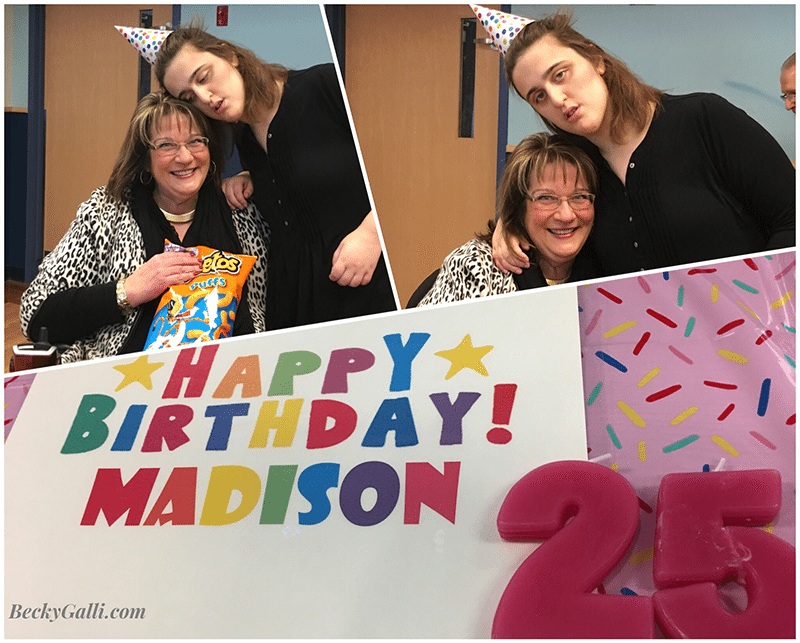 This week’s inspiration comes from my daughter, Madison. As most of you know, Madison is severely impacted by autism and is currently in an in-patient hospital setting awaiting a new residential placement, a journey that has been filled with epic fails, “unexpected success,” plenty of drama, and several deeply insightful moments, courtesy of the power of better.
This week’s inspiration comes from my daughter, Madison. As most of you know, Madison is severely impacted by autism and is currently in an in-patient hospital setting awaiting a new residential placement, a journey that has been filled with epic fails, “unexpected success,” plenty of drama, and several deeply insightful moments, courtesy of the power of better.
Meanwhile, I visit her when I can.
Last week, she turned twenty-five. How fabulous!
But the visit wasn’t.
Now that I’ve had a few days to reflect on it, it was probably my fault. I had this vision in my head.
There would be a party.
Madison would be wearing a hat.
Madison would be happy to see me.
We would take pictures.
There would be cake.
She would open presents.
We would sing happy birthday to her, and she would smile.
Not exactly.
All was going well until Madison apparently ran out of patience. Triggered by one of the birthday party attendees, the noise level got so loud it brought tears to my eyes as I watched the beautiful celebration disintegrate and Madison lose her cool.
She jumped up from the table, raising her own voice in a long, high-pitched screech as if to complain or at least reclaim her role as the center of attention. The room roared with competing vowels—eee’s and ah’s and aye’s—no words, just one cacophonous stream of loud.
“I can’t do it,” I whispered to one of the staff members. “It’s just too much for me. Can we go to another room?”
Madison acted as if she heard me, even though she was out of earshot. She bolted out of the room with her shell-shocked entourage in her wake, leaving the loudness behind. She sat down in the other room, but not for long. She was still unsettled.
She could not find her calm.
She stood up and came toward me. I thought she was going to give me a kiss. Instead, she scooted around the side of my power wheelchair (that weighs 385 pounds) and shoved her hip into my back as she tried to edge us toward the door.
She wanted to leave. When I didn’t budge, she grabbed my hand.
She wanted to leave with me.
Skillful staff gently redirected her away from me. But she persisted, grabbing her coat and raising her voice again. I watched in dismay as my daughter reverted to old behaviors, behaviors I had allowed myself to believe were gone. My eyes welled again.
“Madison is still Madison,” one staff member reminded me, touching my arm to accent her point. “She’s better, but she is who she is.”
I looked at her face through my tears and I wanted to punch her in the nose. Like I needed that sentiment at that point in time? Are you kidding me? I wanted to fire back at her. But I took a deep breath instead.
The truth can be hard to hear sometimes.
“I think I need to leave,” I finally admitted. “Maybe she’ll settle down once she realizes she’s not going with me.”
And she did, they told me later.
She never dropped and stayed on the floor as she would have in the past. She never hit her cheek. She never was out of control. That’s huge progress, staff reminded me.
And it was.
At least I got a picture with my birthday girl. At least I got a hug. And, best of all, she got to demolish half a bag of Cheetos. (Note her eyeing them in the photo above. That girl does love her Cheetos!)
So what was inspiring about this visit? Once again, Madison made me think. She made me examine myself.
Why was I angry and in tears?
My expectations were too high.
Sometimes expectations are resentments-in-waiting, I’ve heard my sister, Rachel, say more than once.
Ouch.
Perhaps my vision was too crisp, my plans too set.
Maybe I need to soften both. Maybe there’s a place for fuzzy thinking and foggy plans.
How about you? Have you ever set your expectations too high and experienced the fallout of them not being reached? Tell me about it. I’d love to know.
Also, I’d LOVE it if you would join me in celebrating Madison’s birthday! You can help with a donation to the Madison Banner, at our annual Pathfinders for Autism Golf Tournament. She keeps me learning and moving forward, that’s for sure.
My best–always,
Becky (Nana B)
P. S. If anyone is familiar with Maria Shriver’s Architects of Change and can offer assistance to me, please reply and let me know. I’d really appreciate it!
Sign Up Here, if you’d like to receive Thoughtful Thursdays via email.
Follow Me!